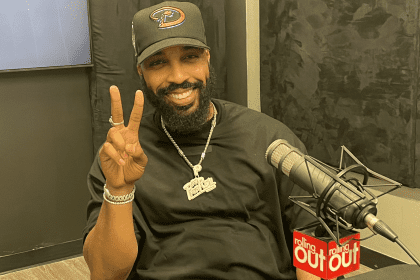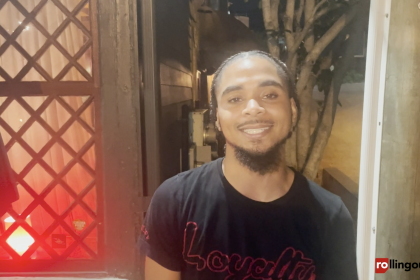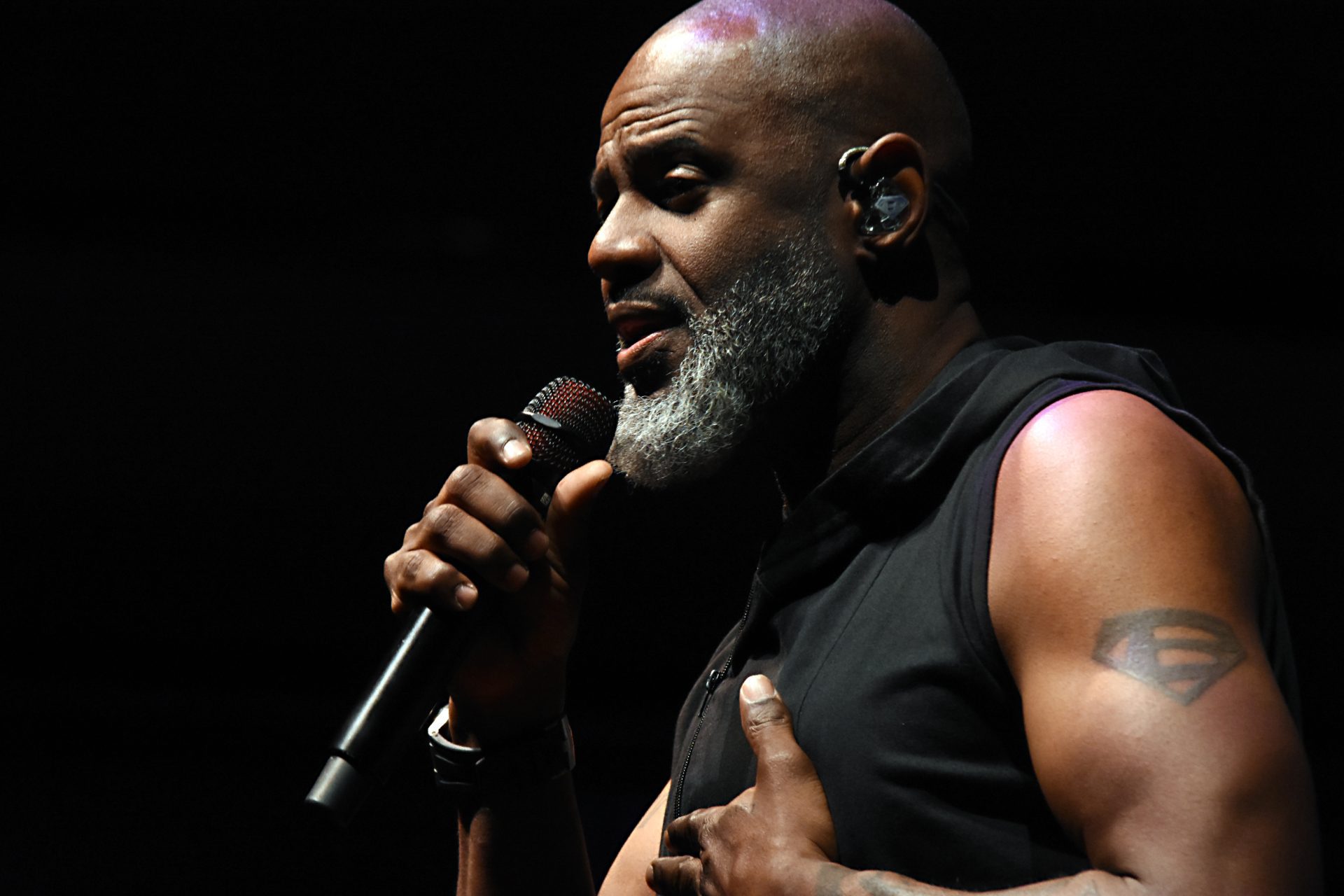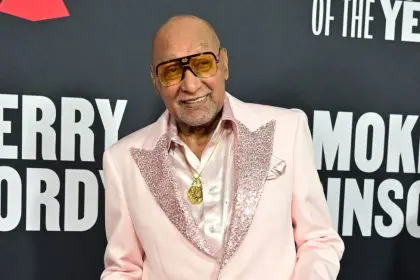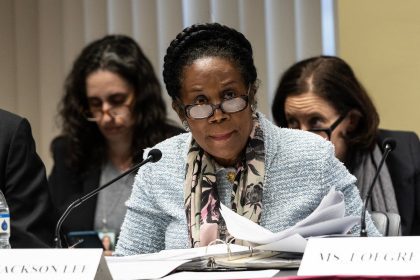
On Sunday, March 12, 2016, the city of Atlanta saw the passing of local R&B and “Chitlin Circuit” legend Tommy Brown; he was 84. To talk about Tommy Brown, known as the “Weepin and Cryin” man, is to talk about the roots of popular Black music and the club scene of the 1950s and early ’70s, all the way to today.
Brown was my friend and teacher. In 2004 and 2005, I received a grant from the Georgia Council of the Arts Traditional Arts Apprenticeship Program to study music, history, stagecraft and showmanship with Tommy. The obituary I write today is part history and part of the narrative I received directly Tommy.
He was born on May 27, 1931 in Lumpkin County, Georgia. He came from a religious home and his father was an AME minister. The entertainment bug got him at an early age and he performed as a dancer in the first grade. From there, he constantly studied and performed music and developed his signature style and storytelling. Performing all through his youth, he attended Morris Brown College in Atlanta in 1949. But Tommy’s love of the musical stage interfered with his studies. Tommy told me his professor asked him in class, “Mr. Brown, why are you here?” To which Tommy replied, “I don’t know” and left the classroom for the stage.
He then began a musical journey that made him a top performer and recording artist in the early days of R&B. In 1949, he recorded the hit song “Atlanta Boogie” on Regency Records, which was part of the Savoy Record label. The song was upbeat and swinging and the lyrics give you an idea of what life was like for the party people in Atlanta back then:
“Well, the whole town’s rockin’ just about the break of day
Well, when the bar starts jumpin’ you can hear the cats all say
Well, let’s rock’n’roll, well, let’s rock’n’roll
Yes, let’s rock’n’roll till the break of day”
Tommy would tell you that all popular music came from the blues. He explained that at its roots it contains beats and melodies that were popular with people and as Black folk moved into the city life they added rhythm to the music. This is what gave us all forms of popular music. Like jazz for instance, it was not a musical form among the musicians it was a term. We would say jazz it up and it soon became a particular form of music that we know today. Even early Rock and Roll was an upbeat tempo and form of Blues that was made popular by us and then eventually stolen from us. It was all Black or “Race Music” as it was officially called, in its creation and form, even today modern R&B is still rhythm and blues. The term R&B came about because the music was becoming popular and Whites were buying more Black music. Blues became popular music When we hear the word Pop music it means popular music and the first popular music was blues.”

In 1951, Tommy Brown was hitting the radio and making waves in the charts. He had two top ten songs that made the R&B charts “Tra-La-La” and his signature song “Weepin and Cryin” that reached #1 on the BillBoard R&B chart. Clubs such as the Wallahachie, Magnolia Ballroom and the Royal Peacock all saw Tommy as the featured performer. Tommy never drank and it saved his life in that year and inspired a song called “Fat Hardy’s Tardy”. In the 1950s Black clubs in the city of Atlanta could not buy liquor and they were supplied with moonshine by a White man known as John “Fat” Hardy. Hardy weighed a hefty 350 lbs. and was well known to the Atlanta police who he paid off regularly. But one night in October 1951 he cut his moonshine with methyl alcohol (also known as wood alcohol),a known poison that can cause blindness and death. Tommy stated that he saw Fat Hardy enter the club with his delivery as he was leaving and the next morning he heard on the radio, “40 negroes dead from poison moonshine and over 300 hospitalized at Grady.” The incident shocked the nation and Fat Hardy was sentenced to death, but he disappeared while in route to the prison and the police offered no explanation.
That year Tommy was in talks with major labels of the time and was well on his way to becoming a hit entertainer. Tommy told me “I had a meeting with a producer and we had reached an agreement and I was happy. The next day I went to the mailbox and opened up an official letter. It was my draft notice I was going to Korea.” Soon Tommy found himself inducted into the United States Marine Corps where he excelled at his training, including becoming a black-belt in Judo. But Tommy was not going to be sent to the front lines he was going to entertain the troops. Tommy played drums and was part of a “swinging band unit”. During an audition before a general he performed “Weepin and Cryin” and slid across the floor during another song and impressed the general. He soon became a hit among all the troops Black and White for his performances. The Marine Corps was recently desegregated under the Executive Order of then President Harry S. Truman and this was the first time Black and White troops were serving together in integrated units. There was one Marine colonel from Marietta, GA though who had it in for Tommy and his career as an entertainer. According to Tommy “He told me ‘N-word your ass, should be taking a bullet not singing and dancing’ and tried to get Tommy sent to combat duty. The colonel was unsuccessful and Tommy was eventually honorably discharged from the Marine Corps. When Tommy got out of the Corps and was heading back to Georgia he passed by a club that had on the marquee “Tonight Tommy ‘Weepin and Cryin’ Brown”. He was shocked and thought that his friends and manager were welcoming him back as a surprise party. Tommy stated “I got a surprise alright. I walked into the club and there was my old manager he was shocked and said ‘Tommy what are you doing here?’. I replied ‘My name was on the sign and I came in’ that’s when he said ‘You got to go’ and tried to rush me out the door. Then I noticed he had a guy dressed like I would dress on stage with his hair done up the same way singing my song and using my name.” Furiously Tommy left the club upset but determined to continue where he had left off. He eventually left Georgia and performed in Chicago and performed regularly at the club that featured a young Johnny Carson.During this time he met and was befriended Chicago Mafia boss Sam “Mooney” Giancana. The mafioso enjoyed Tommy’s shows and was a frequent sight at the club. Tommy asked him one day while he was leaving “Don’t you worry about coming out here in the open at night?” To which Gianacana replied not at all watch this as he got in his Cadillac. As Giancana was drove off 4 cars in front and 4 cars in back drove with him down the street.
During the late 50s Tommy performed as a drummer for Ike Turner. Tommy stated “Ike Turner was mean as a snake and not to be trusted. The woman loved him because he was well-endowed and followed him everywhere. One time he tied a woman’s wrists to a long rope and tied the other end to the back fender of his car. He then drove down the street with her yelling and pleading how much she loved him and she was just running behind the car. Back then the stores had their groceries supplies left outside the doors real early for the next morning. Ike would regularly steal the food and eat on the road. I found out that Ike had been sleeping with my first wife Anna Mae and I caught them in the act. I came in the door and there was Ike naked in bed with my wife he jumped up and reached for a gun on a nightstand. I grabbed his wrist and arm and threw him with a Judo hold across the room. I picked up the gun and my wife screamed ‘Tommy please don’t kill him’. I almost pulled the trigger but I knew it wasn’t worth it. I told him he could have her and Ike was shocked when I left the house.”
Tommy performed off and on over the years opening a nightclub in Atlanta and also doing a comedy act where he coined his well known phrase “I Ain’t Lyin” that lead to two albums being released in 1967 called ‘I Ain’t Lyin’ and I Ain’t Lyin’ Vol. 2 . In the 1990’s he was part of a ceremony where Billboard recognized his #1 hit “Weepin and Cryin” because he never got an official award plaque. During a conversation he was told that his song was not only #1 in America in the 50s but also in Europe. Tommy states “The fellow I was talking too congratulated me and soon I realized I should have received well over $100k in royalties.” But Tommy never got his money because of a string of legal maneuvers by the label and individuals involved. Despite his upsets he continued on and found got a career surge once again in Atlanta. Tommy became friends with Atlanta musician Danny “Mudcat” Dudeck who recognized the impact of Tommy and his music. Soon Tommy was part of Music Maker Records part of the Music Makers Relief Foundation. Music Makers is a non-profit that rediscovers, promotes and records many forgotten Black ‘Roots Music’ performers who are still living. These artists are often in need of economic and medical assistance and through the foundation they are given support.Tommy soon found himself performing in Europe and Australia as well as across the United States but he still called Atlanta home.
In 2015[cigallery] the city of Atlanta recognized his legacy of music through a formal proclamation given by City Councilman Michael Julian Bond. That same year he was inducted into the Blues Hall of Fame in Memphis, TN. The entire Atlanta Blues community is now “Weepin and Cryin” for our dear friend, brother, teacher and mentor Tommy Brown. Everything I have written about Tommy Brown is true and “I Ain’t Lyin”.


